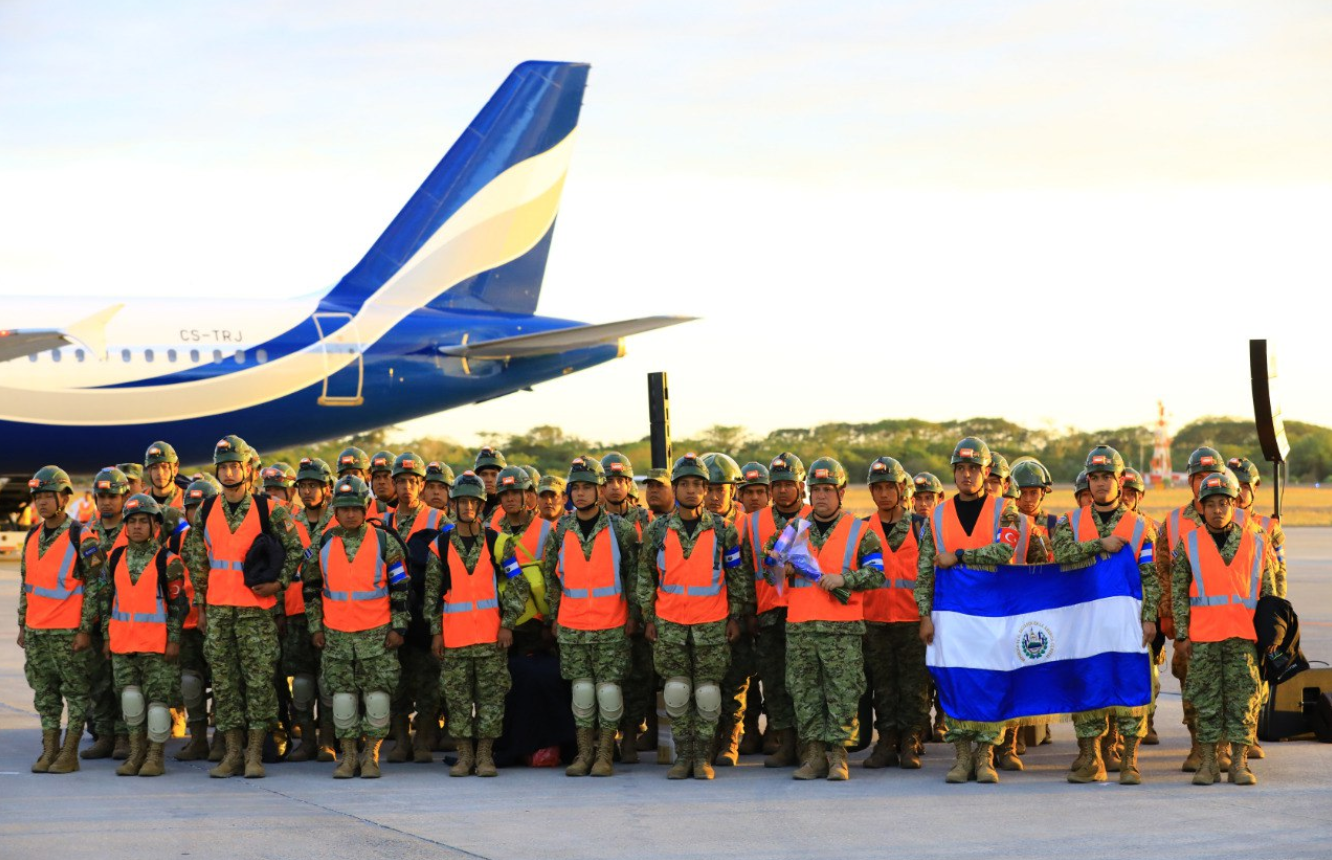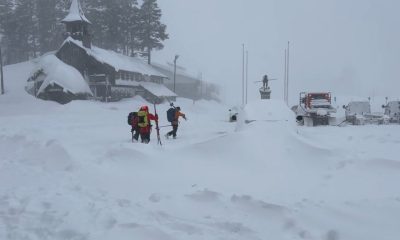Central America
Salvadoran heroes who provided aid in Turkey return home

February 19 |
After nine days away from home, the Urban Search and Rescue Team (USAR) El Salvador and the Humanitarian Rescue Unit (HRU) of the Armed Forces, made up of 111 rescuers, military and health personnel, who carried out search and rescue work in Turkey, returned to Salvadoran soil.
This nation was strongly affected last February 6 by two earthquakes of magnitude 7.8 and 7.6 on the Richter scale, and El Salvador was one of the first countries to send rescue support.
The Salvadoran heroes landed on their return flight on Saturday afternoon at the San Oscar Arnulfo Romero International Airport, where they were received by the authorities of the Ministries of the Interior, Defense, Health, the Vice Minister of Foreign Affairs and the directors of Civil Protection and Firefighters.
“Thank you, a great job, it is a pride to work with you, it is a pride to have you at home, welcome heroes”, were the words of the Minister of the Interior, Juan Carlos Bidegain.
He added that thanks to the work done, El Salvador was able to demonstrate in Turkey that it has highly prepared teams that have now been placed among the elite USAR teams around the world.
“We are the ones who are grateful to you, what you have done, what you have done is incredible, what you have done is wonderful,” said Bidegain.
For his part, Erick Vázquez, lieutenant of the USAR-EL SALVADOR group, in his report to the authorities, highlighted the rescue of two people alive.
“We have done a job with all the logistics involved, we went to put into practice everything we learned. We had the joy of performing two rescues, a minor and a woman of approximately 30 years of age, we are proud to have done it”, celebrated Vázquez.
He explained that during their stay in Turkey, from February 9 to 17, they worked in 15 buildings, in which the canine unit and the rescuers did the work they were assigned to do, earning the respect and admiration of USAR groups from the rest of the world.
“Leaders of other USAR groups around the world have told us that we have positioned ourselves among the best, along with France, Germany and Egypt, among others,” Vazquez said.
The recognition given by the leaders of other USAR groups was also shared by Defense Minister Rene Francis Merino Monroy.
“I want to highlight the level of the two search teams of El Salvador [USAR and UHR] to provide assistance to other countries,” said the official.
At the same time he added: “We have in El Salvador a response team that can highly prepared to help foreign countries”.
Merino Monroy congratulated the USAR and UHR team of the Armed Forces for putting the name of El Salvador on high and fulfilling the mission entrusted to them.
“The mission that was entrusted to them, to the USAR and UHR group of the Armed Forces, to rescue lives was fulfilled, in addition to reviewing and cleaning each of the buildings in which they worked,” said the minister.
Turkey’s ambassador to El Salvador, Gül Büyükerşen, also received the heroes and expressed her gratitude for the support of the Salvadoran teams, as well as to President Nayib Bukele’s willingness to help from the first moment.
“President Nayib Bukele was one of the first leaders who spoke with my president, Recep Tayyip Erdoğan, by phone (after the earthquakes),” said the diplomat.
In addition, he stressed that “El Salvador may be a small country (in territory), but it has a big heart”.
Central America
Washington Imposes Visa Ban on La Modelo Director Amid Crackdown in Nicaragua

The United States government announced Wednesday that it has imposed visa restrictions on Roberto Clemente Guevara Gómez, director of Nicaragua’s largest prison, La Modelo, for his involvement in actions that violate human rights.
In a statement, U.S. Secretary of State Marco Rubio said the measure is intended to promote accountability for abuses committed under what he described as the “Murillo-Ortega dictatorship” against political prisoners.
Rubio specified that Guevara Gómez was designated for participating in “a gross violation of the human rights of a political prisoner.” The sanction was issued under the 2024 Department of State, Foreign Operations, and Related Programs Appropriations Act, which bars the sanctioned individual — and potentially immediate family members — from entering the United States.
“United States demands the immediate and unconditional release of all political prisoners unjustly detained in Nicaragua,” the statement added.
Ongoing tensions between Washington and Managua
Washington rejected Nicaragua’s November 2021 elections, in which President Daniel Ortega and his wife, now co-president Rosario Murillo, were reelected while seven potential challengers were in prison.
Relations between the two countries remain tense amid expanding U.S. sanctions and increasing diplomatic pressure on the Nicaraguan government.
On January 10, marking Ortega’s 19 years in power, Nicaragua released “dozens of detainees,” including political prisoners. The move came one day after the U.S. Embassy in Managua stated that “more than 60 people” remain “unjustly detained or disappeared” in the Central American nation.
U.S. officials have continued to push for the “unconditional release” of political prisoners rather than selective or temporary releases.
Ortega, 80, governs alongside Murillo with consolidated authority, having strengthened executive power through constitutional reforms and security measures, while the opposition has been weakened by imprisonment, exile, and the revocation of citizenship and property rights.
Central America
Guatemala’s Attorney General Consuelo Porras Loses Bid for Constitutional Court Seat

Guatemala’s attorney general, Consuelo Porras, who has been sanctioned by the United States over corruption allegations, lost a key vote on Monday in which a public university selected two of the 10 magistrates for the country’s highest constitutional court. However, she could still seek a seat through another nominating body.
The election of five full magistrates and five alternates to the Corte de Constitucionalidad (CC) is taking place gradually over more than two months and is considered crucial in the ongoing struggle for control of Guatemala’s judiciary, which critics say has long been influenced by a political and economic elite accused of corruption.
According to results announced at a press conference, the governing council of the Universidad de San Carlos de Guatemala (USAC) rejected Porras, who had applied as either a full or alternate magistrate, and instead chose two candidates aligned with the university rector. The vote was held at a hotel in Antigua, about 35 kilometers from the capital.
Despite the setback, Porras — whose term as attorney general ends on May 16 — could still be nominated to the Constitutional Court by the Corte Suprema de Justicia, which appoints two magistrates. The remaining six are selected by the president, the bar association and Congress.
“It’s always a possibility,” the 72-year-old lawyer said days earlier when asked by reporters whether she would seek nomination through another institution if she lost the USAC vote.
Porras has been sanctioned by Washington and the European Union for allegedly attempting two years ago to block the inauguration of President Bernardo Arévalo and for pursuing legal actions against anti-corruption prosecutors, judges, journalists and social leaders since taking office in 2018.
The USAC vote was controversial because most members of the university’s governing council are serving beyond the expiration of their terms. Students, academics and social activists staged protests against Porras’ candidacy.
Central America
Teens visit ETESAL substation to learn about responsible energy use

Within the framework of World Energy Day, teenagers from the institutional care center Ciudad Niñez y Adolescencia (CNA), run by the Consejo Nacional de la Primera Infancia, Niñez y Adolescencia (Conapina), took part in an educational visit to a substation operated by Empresa Transmisora de El Salvador (ETESAL) in Santa Ana.
The aim of the activity was to give participants first-hand knowledge of how the country’s electricity transmission system works and to highlight the importance of responsible energy use.
During the tour, the group learned about the process that delivers electricity to homes, businesses, and industries. They were also introduced to specialized technical equipment and the safety measures required to ensure an efficient and reliable service.
Before the guided visit, the teenagers attended two informative talks and an environmental awareness session focused on the relevance of responsible energy consumption and its impact on the environment.
According to Nelson Menjívar, head of Conapina’s programs unit, the initiative serves a dual purpose. “It has two objectives: a recreational component and an educational one, so that adolescents can learn about the work carried out by ETESAL and how some of the resources they use at home are generated. This is in keeping with the guarantees established under the Crecer Juntos law; we ensure those rights for children,” he said.
Menjívar stressed that these activities help young people better understand how essential services function in their daily lives while promoting efficient consumption habits and a culture of environmental respect and care.
The event is part of the principle of shared responsibility set out in the Crecer Juntos law, promoted by the administration of Nayib Bukele, which states that families, society, private companies, and the State must work together to safeguard the comprehensive well-being of children and adolescents.
-

 International1 day ago
International1 day agoFamily of “El Mencho” Seeks Return of Body After Deadly Military Operation
-

 International1 day ago
International1 day agoLarry Summers Steps Down from Harvard Role Amid Epstein Controversy
-

 International5 days ago
International5 days agoNinth Victim Recovered After Deadliest U.S. Avalanche in Decades
-

 International1 day ago
International1 day agoIran’s President Optimistic Ahead of Geneva Nuclear Talks with U.S.
-

 International3 days ago
International3 days agoOver 40 Million Affected by Major Snowstorm in Northeastern U.S.
-

 International1 day ago
International1 day agoStephen Hawking Photo Appears in Newly Released Epstein Documents
-

 International1 day ago
International1 day agoBill Gates Admits “Serious Mistake” Over Epstein Ties
-

 International3 days ago
International3 days agoNine People Killed in Two Armed Attacks in Manabí, Ecuador
-

 International3 hours ago
International3 hours agoCocaine Production Surges 34% in 2023 as Market Expands into Africa and Asia
-

 International3 hours ago
International3 hours agoClinton Accuses Republican Committee of Using Epstein Case to Shield Trump
-

 International3 hours ago
International3 hours agoFederal Judge Blocks Trump Policy Allowing Deportations to Third Countries




























